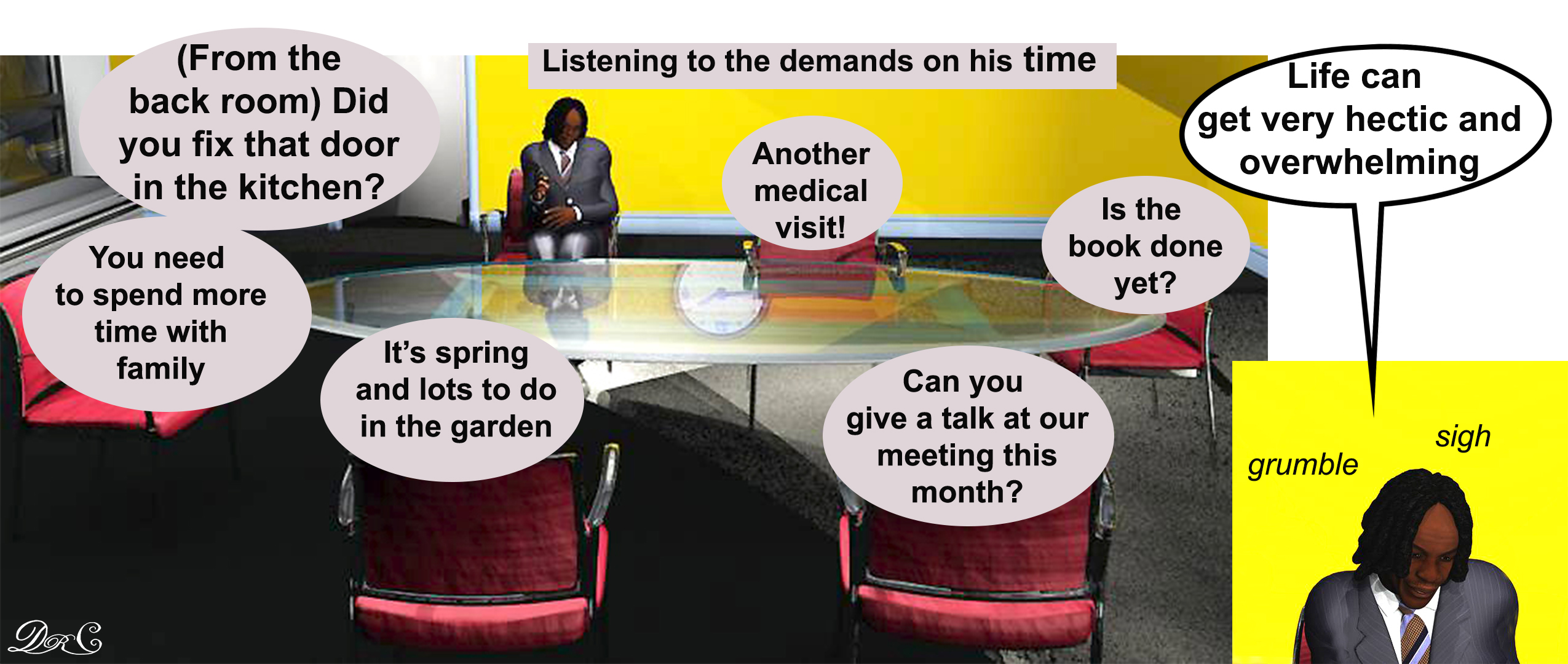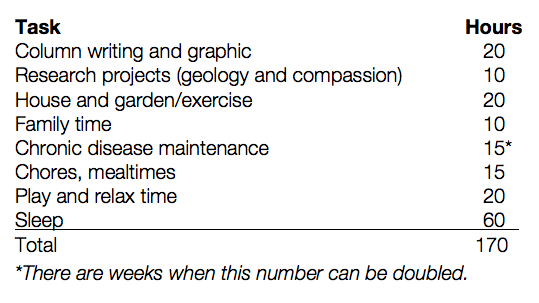How Did Life Get Crazy Busy? I’m Overwhelmed!
Written by |

(Image courtesy of Dr. C)
I thought that when I retired, I would have more time, not less. How did life get so busy? There are not enough hours in the week to finish all the things I want to. If I push myself harder and longer, then I get fatigued and overwhelmed, but then I need more rest, which results in less time. That thwarts the desired outcome.
I have a long to-do list, and I feel oppressed just looking at it, particularly when I am already worn out. I have been fighting this battle for the past five years, and there are a few things that make it a little easier for me.
To give you some idea of what my seven-day week looks like, here is my to-do list, with the average number of hours spent on each task:
A seven-day week has 168 available hours. I am already overbooked, and I haven’t included several projects that are on my waiting-to-do list. These include finishing/publishing three manuscripts, finishing/publishing my graphic novel, and a blog that hasn’t had a new post in over a year.
There is “Santa,” an important part of my identity, which will consume most of my time in December. Finally, there are requests for my professional services, such as a paper or a presentation. When these requests come in, something on the above list must change, and it can be too much.
Join the Parkinson’s forums: an online community for people with Parkinson’s Disease and their caregivers.
The emotional confusion of being overwhelmed puts a halt to effective project engagement. The way out of being so damn busy and feeling weighed down is to put into place some form of a time management system. The first thing is to realize how much time your chronic disease consumes each week. There are lots of ways this happens, and flexibility is crucial to coping.
The second thing is to set aside the time needed for things that add to your well-being, like sleep, exercise, meals, and family. If you are like me, with lots of irons in the fire, you have a full list of things that require your time. It comes down to making choices, setting priorities. Sometimes, we have to say no to people.
Time is a resource that can be thought of like money. There is a limited “time budget” to spend, and I want to allocate that time in the best way possible in order to get the most out of this life with a chronic disease. I spend time in concentrated blocks of three to four hours. This helps to avoid distractions. Also, these blocks can be reallocated when something unexpected comes up — something always does!
Delegation, when appropriate, is a good time-management strategy. My partner has taken on the email, social networking, and the appointment calendar, which frees up time.
There are resources to help with time management skills. Here are a few:
1. A time management skills book that looks at multiple life demands on our time
2. A 30-minute audiobook talk with clear tips on time management
3. A TED Talk on time management
4. Columnists who offer time-management tips and time-management apps
What issues do you face with not having enough time in the week to get everything done?
***
Note: Parkinson’s News Today is strictly a news and information website about the disease. It does not provide medical advice, diagnosis or treatment. This content is not intended to be a substitute for professional medical advice, diagnosis, or treatment. Always seek the advice of your physician or another qualified health provider with any questions you may have regarding a medical condition. Never disregard professional medical advice or delay in seeking it because of something you have read on this website. The opinions expressed in this column are not those of Parkinson’s News Today or its parent company, Bionews Services, and are intended to spark discussion about issues pertaining to Parkinson’s disease.







Mark Pittman
Thank you! I am looking forward to checking out the resources you list. Has been about two years since Parkinson's diagnosis identified the "something's wrong." Sleep disruption, fatigue and cognitive impairment have left me overwhelmed. Making some big changes to get on top. Needed some practical advice. Thanks again!
Dr. C
Thanks for the post. I try to leave our readers with some practical tips in every column. Dealing with a chronic illness can be quite difficult and all of us can use suggestions on how to make the journey a bit easier. Compassionate blessings.
Ern Shivers
Are you for real? Im struggling just to do the basics with my P.D.Time management depends on what i can do at any given point in any day.Plans and fulfillment not a realty with my PD.
Dr. C
I am still in the early stage of my battle with PD. Like yourself, folks are going to be at different stages in the progression. I also have bad days (spoke to this in a previous column). I agree totally with you that there are days when I have to take each moment as it comes and then decide what my body will let me accomplish. Maybe you are also saying that you can't make firm plans because you never know how bad the day will bring in terms of symptoms. I have to deal with this all the time, but it doesn't stop me from having goals. It only forces me to be flexible with when I can dedicate time to accomplishing those goals. It was not easy to learn how to let go of "doing" all the time but with PD I have to rest. I talked about blocking out 3-4 hour chunks of time. It's the amount of time I can apply most days to any goal. Maybe your time blocks are different. I also mentioned being flexible with these time blocks. I try to fit them into the best part of my day so I can accomplish things - being flexible is important....Thanks for the comment and giving me the opportunity to clarify. Compassionate blessings.
pearl Fu
I am on my 20 years of parkinson's ailment.This year my symptoms has gotten worse. I am extremely stiff and slow.Have difficulty in turning around.Cannot walk smoothly, or use my hands.My husband who is 10 years older is exhausted and frustrated by being my caregiver..I force myself to exercise in the YMCA pool at least twice a week(Now have a lady who goes with me helping me with balance,showering etc.) yoga and physical therapy. I am exhausted everyday.Very stressed out.Peole always compliments me aAYING HOW well I am doing.I have good days and bad days. Most of the time I stay at home after exercising.My neurologist says I do not have the typical PArkinsons.I am very stressed out. I was very busy,as the creator/ executive Director of a humanitarian org called "LOCAL COLORS" encouraging people of all color, backgrounds, religion,socioeconomic levels, age to get together to learn and embrace, spread peace and goodwill throughout the world.I was always ready speak up and confront discrimination, injustice etc. in all circumstances in schools, courts, organizations, government assoc. etc.I loved being busy and helpful. But since PArkinsons' I have changed completely: full of anxiety, keep in the background. Mobility greatly reduced physically and mentally. HArdly remembers important facts and names.SO very frustrated.Recently, my feet tends to freeze and unable to move after sitting.MAkes it very difficult to attend events. I stay at home most of the time.No relatives live us. Thinking seriously of moving to Philadelphia to be near our 3rd daughter. DO not like to bother friends for favors. Do not want to go to expensive senior homes.Husband is an introvert,does not like socializing. I am the opposite. Looking forward to hearing from you.
Sincerely, Pearl Fu age 76
Tom Harrington
Thank you for addressing time use. I have been plagued by it for a few years and regularly revisit my strategy. It is not just an issue with PD, but this disease, and I suspect others, exacerbates the problem. Additionally, for me, there is some loss of quality in my time due to a lack of mental clarity associated both with PD and aging. In my own off-the-cuff surveying, I have found that having too much to do in the same 24 hour day is an issue that is affecting most of the population. Younger generations also experience the time crunch. As a poet, I require a substantial amount of solitary, open ended time. The only solutions I've found are consistent re-prioritizing, and paying attention each moment, so I don't waste time. One recent discovery is that to lessen the effects of PD and improve life, I've increased my exercise regime by 25% and find it does have the effect of lessening PD issues, making me more efficient and focused in the same amount of amount of time because of less tiredness and mind fog. I am 77, diagnosed 5 years ago, and, I believe fortunate to have the level of PD I experience. It seems difficult to asses the type or severity of different cases of PD.
Dr. C
Excellent post! I am hoping more readers will write of their time management strategies. I like the counter-intuitive idea that spending more time on exercise actually gives you back more time in the day to do things because of better disease management (Note: I think the whole CHRONDI Creed approach does this). I also need those solace, contemplative, times in my life. Without them these columns wouldn't happen.
Cathy R
I know I am having a hard time of it. I'm at the ten year mark at 65 yrs old. I am totally overwhelmed not being able to complete my responsibilities I would like to accomplish in a day. Always seem I'm behind, making stupid mistakes, all those things you've been talking about. It's really effecting my anxiety level and I wake up very stressed instead of peaceful. I want peace! I don't have help and my family thinks I can do all these things and I'm struggling, instead of living my best life. It's not that I don't want to keep up with everything but sometimes I'd like to just relax and smell the roses. I have no strategies to share. I'm afraid I'm in the needy zone. Wish I had a helper, don't really need a CareGiver. What to do?
Dr. C.
Hi Cathy ~ Mrs. Dr. C. and I read your comment together. We both blurted out..."OMG, that's exactly what we both go through every day!" One of the reasons we wrote the book, "Possibilities with Parkinson's: A Fresh Look" and why we continue to write the columns on how PD affects us. We also share the anxiety and stress of feeling like we aren't getting things done the way we would like. At this point we are working on trying to accept the day as it presents, trying to use PD self management strategies to offset the worse of times, and learning to be kind to ourselves. Some days are better than others.
Thanks for reading the column, and following along with Dr. C. We really appreciate your comments & insights. Hopefully our columns might provide some suggestions for you.
Dr. C. (and Mrs. Dr. C.)